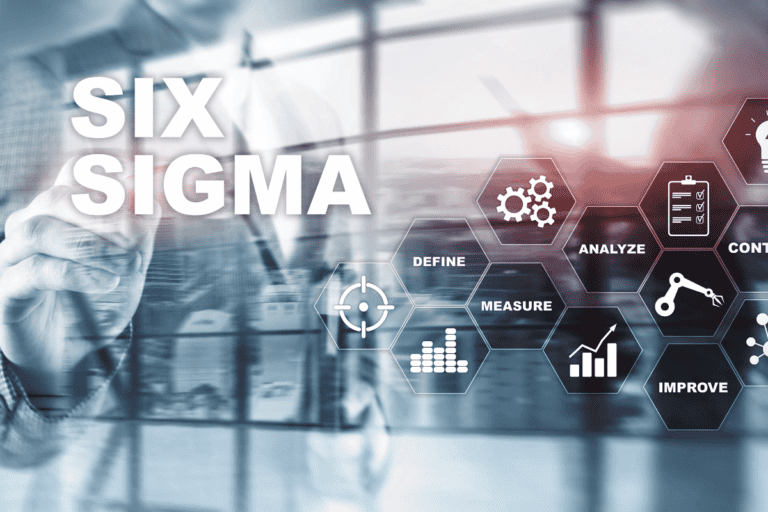Certified Reliability Engineer (CRE)
Reliability is a crucial aspect of any product or system, ensuring its performance and durability. Certified Reliability Engineers (CRE) are professionals who specialize in evaluating and predicting performance to enhance safety, reliability, and maintainability.
Obtaining the CRE certification is a significant milestone in the career of a reliability engineering professional. Accredited by ANSI, the certification program covers a wide range of topics, including design review, failure mode effects analysis, reliability testing, and human factors.
Are you interested in becoming a Certified Reliability Engineer or exploring the benefits of this certification? In this article, we will delve into the CRE certification requirements, exam details, preparation resources, and the various job opportunities that await those who hold this esteemed credential.
Key Takeaways:
- Becoming a Certified Reliability Engineer is a prestigious achievement in the field of reliability engineering.
- The CRE certification program covers essential topics such as design review, failure mode effects analysis, reliability testing, and human factors.
- Professionals who have authority over project/process outcomes and hold decision-making positions are ideal candidates for the CRE certification.
- The CRE exam consists of 165 multiple-choice questions and has an appointment time of four-and-a-half hours.
- Other certifications, such as Certified Maintenance & Reliability Professional (CMRP) and Certified Reliability Leader (CRL), offer specialized expertise in different aspects of reliability engineering.
Who Should Certify?
The Certified Reliability Engineer (CRE) certification is designed for professionals who play a key role in defining, executing, or controlling projects and processes and have authority over outcomes. It is particularly relevant for individuals working in the field of reliability engineering, seeking to enhance their expertise and demonstrate their commitment to quality and reliability.
Individuals who have previously obtained certification from the American Society for Quality (ASQ) in other quality-related fields may be eligible to have their experience applied towards the CRE certification. This can provide a streamlined path for those already certified by ASQ, as their existing knowledge and expertise can be recognized in the context of reliability engineering.
Being a Certified Reliability Engineer (CRE) offers numerous benefits, such as career advancement opportunities and an increased understanding of performance evaluation and prediction. If you work in a role where you define, execute, or control projects or processes, and have authority over outcomes, the CRE certification can help you stand out in the field of reliability engineering.
Requirements
To become a Certified Reliability Engineer (CRE), candidates must meet specific requirements that demonstrate their expertise and experience in the field. These requirements ensure that certified professionals possess the necessary skills and knowledge to perform their roles effectively.
Experience
First and foremost, candidates must have at least 8 years of full-time, paid experience. This experience should be directly related to reliability engineering or a closely related field. The purpose of this requirement is to ensure that candidates have gained sufficient practical knowledge and hands-on experience in the industry.
Furthermore, out of the 8 years of experience, candidates must have at least 3 years in a decision-making position. This means that applicants should have held roles where they have been responsible for making critical decisions that impact the reliability, safety, and performance of products or systems.
Educational Waivers
In addition to the experience requirement, candidates have the opportunity to obtain educational waivers for the CRE certification. These waivers consider the level of educational degree attained by the candidate and can waive a portion of the required experience. The amount of experience waived varies based on the level of degree obtained.
“Experience requirements combined with educational waivers ensure that certified reliability engineers have both the theoretical knowledge and practical expertise to excel in their roles.”
To understand how the educational waivers work, refer to the following table:
| Educational Level | Experience Waived |
|---|---|
| Bachelor’s Degree or Associate Degree | 2 years |
| Master’s Degree | 4 years |
| Doctoral Degree | 5 years |
These educational waivers provide well-rounded professionals with a diverse combination of academic knowledge and practical experience. It ensures that the CRE certification is accessible to individuals at different educational levels without compromising on the depth of expertise required in the field.
Next, let’s explore how candidates can best prepare for the CRE exam to increase their chances of success.
Prepare for the Exam
As you embark on your journey to become a Certified Reliability Engineer (CRE), it’s crucial to thoroughly prepare for the exam. The American Society for Quality (ASQ) provides valuable resources to aid candidates in their exam preparation.
One helpful resource is the list of references recommended by ASQ. These references cover essential topics and provide in-depth knowledge necessary for success in the exam. By studying these references, candidates can gain a comprehensive understanding of the concepts and principles of reliability engineering.
“The CRE Handbook and the CRE Question Bank serve as indispensable tools during the preparation process.”
In addition to the references, ASQ offers the CRE Handbook, which serves as a comprehensive guide in navigating the exam content. This handbook provides valuable insights into the key topics covered in the exam, offering a structured approach to exam preparation.
Furthermore, the CRE Question Bank is a valuable resource that offers sample exam questions. This supplement allows candidates to familiarize themselves with the format and style of the questions that may appear on the actual exam. It provides an opportunity to assess and enhance their knowledge and understanding of the exam content.
By utilizing these resources, candidates can gain the confidence and knowledge needed to excel in the CRE exam.
In the next section, we will delve into the details of the CRE exam, including the format, duration, and other important factors to consider.
Exam Details
Aspiring professionals seeking the Certified Reliability Engineer (CRE) certification must be prepared for the comprehensive CRE exam. This section provides an overview of the exam format and details that candidates should be aware of.
Exam Overview
The CRE exam is designed to evaluate candidates’ knowledge and proficiency in various aspects of reliability engineering. It consists of 165 multiple-choice questions and has a total appointment time of four-and-a-half hours. The exam is administered in English and is considered an open-book exam, providing candidates the opportunity to reference study materials during the test.
Exam Options
The American Society for Quality (ASQ) offers candidates both computer-based and paper and pencil options for taking the CRE exam. This flexibility allows individuals to choose the format that best suits their preferences and testing environment.
Exam Content
The CRE exam covers a wide range of topics specific to reliability engineering. It assesses candidates’ understanding of key concepts, principles, and best practices essential to thrive in a reliability engineering role. The exam content includes, but is not limited to:
- Design review
- Failure mode effects analysis
- Reliability testing
- Human factors
For a detailed breakdown of the exam content, candidates can refer to the ASQ’s official CRE Body of Knowledge document.
Image Related to the CRE Exam
The image above illustrates the importance of the CRE exam in assessing and certifying the reliability engineering skills and knowledge of professionals in the field.
| Exam Details | Description |
|---|---|
| Total Number of Questions | 165 |
| Exam Duration | Four-and-a-half hours |
| Exam Format | Multiple-choice |
| Language | English |
| Open-Book Policy | Yes |
This table provides a quick summary of the essential details regarding the CRE exam, including the number of questions, exam duration, format, language, and the open-book policy.
Body of Knowledge
The Body of Knowledge for the CRE certification covers a wide range of topics, providing comprehensive knowledge and practical skills in the field of reliability engineering. These topics are essential for professionals seeking to become Certified Reliability Engineers and excel in their careers.
Here are some key areas covered in the Body of Knowledge:
- Strategic Management: The strategic management component focuses on developing and implementing reliability engineering strategies within an organization. It covers topics such as establishing objectives, assessing risk, and aligning reliability goals with business objectives.
- Probability and Statistics: Probability and statistics play a crucial role in the field of reliability engineering. This component covers concepts such as probability distributions, statistical analysis, and data interpretation. Understanding these concepts enables engineers to assess and forecast the reliability of products and systems accurately.
- Reliability Program Management: Reliability program management involves the planning, execution, and evaluation of reliability engineering initiatives. This component covers topics such as reliability testing, failure analysis, and maintenance optimization. It equips engineers with the skills to develop effective reliability programs and ensure the continuous improvement of products and systems.
- Ethics, Safety, and Liability: Ethics, safety, and liability are crucial considerations in reliability engineering. This component emphasizes ethical and responsible decision-making, ensuring the safety and integrity of products and systems, and understanding liability issues associated with reliability engineering practices.
ASQ provides a downloadable document that outlines the specific subtopics within each area. This document serves as a comprehensive guide for individuals preparing for the CRE certification.

The image above visually represents the diverse areas covered in the Body of Knowledge for the CRE certification, demonstrating the depth and breadth of knowledge required to excel as a Certified Reliability Engineer.
Policies & Procedures
When preparing for the Certified Reliability Engineer (CRE) certification exam, it is essential to familiarize yourself with the exam’s policies and procedures. These guidelines ensure a fair and consistent testing experience for all candidates.
Identification Requirements
On the day of your exam, you must present a valid form of identification. Acceptable forms of identification include:
- Government-issued photo ID (e.g., driver’s license, passport)
- Military ID
Make sure that the name on your identification matches the name you used during the registration process. If there are any discrepancies, contact the certifying body for further instructions.
Calculator Policies
The use of calculators is allowed during the CRE exam. However, there are certain guidelines that you must adhere to:
- Only non-programmable calculators are permitted. Programmable calculators, including those with text storage and retrieval capacity, are prohibited.
- The calculator must not have any built-in or attached printing capabilities.
Be sure to review and follow the calculator guidelines provided by the certifying body to avoid any issues during the examination.
References and Open Book Policy
The CRE exam follows an open-book policy, allowing candidates to use specific references and resources during the test. These resources include:
- Certified Reliability Engineer Handbook
- Approved reference materials provided by the certifying body
It is essential to familiarize yourself with the allowed references and ensure that they are accessible and compliant with the exam guidelines.
Appointment Arrival Time
Arriving at the testing location in a timely manner is crucial to ensure a smooth experience. Candidates are advised to arrive at least 30 minutes before their scheduled exam appointment. This extra time allows for check-in procedures and any necessary administrative tasks.
Rescheduling and Cancellation Policies
In case of unforeseen circumstances, candidates may need to reschedule or cancel their exam appointment. Each certifying body has its specific policies regarding rescheduling and cancellations. Make sure to review and understand these policies to avoid any penalties or fees.
By understanding and adhering to the policies and procedures of the CRE certification exam, you can ensure a stress-free testing experience. Familiarize yourself with the identification requirements, calculator policies, references, and arrival time guidelines. Additionally, be aware of the rescheduling and cancellation policies to avoid any unnecessary issues.
Exam Results
After completing the Certified Reliability Engineer (CRE) exam, candidates eagerly await their results to see if their diligent preparation has paid off. The release of exam results brings a mix of anticipation and excitement as aspiring CREs discover whether they have achieved the esteemed certification.
For those who have taken the computer-based exam, the wait is short-lived. Upon completion of the test, candidates receive their results immediately. The instant feedback provides a sense of relief and allows individuals to celebrate their accomplishment without delay.
However, for candidates who have opted for the paper-based exam, a brief period of patience is required. The American Society for Quality (ASQ), the organization responsible for administering the CRE exam, communicates results for paper-based tests within 3-5 business days. Although it may seem like an eternity, this waiting period allows for the careful evaluation and processing of the exam papers.
“The moment of truth arrives as you open the email or letter containing your CRE exam results. Anxiety gives way to sheer excitement when you discover that your efforts have paid off, and you have successfully passed the exam.”
Upon passing the CRE exam, ASQ bestows digital certificates and badges on successful candidates. These prestigious credentials serve as tangible evidence of the individual’s knowledge, skills, and dedication to the principles of reliability engineering. Displaying these digital badges proudly not only validates one’s expertise but also provides a competitive edge in the industry.
Other Reliability Engineering Certifications
In addition to the Certified Reliability Engineer (CRE) certification, there are several other valuable certifications available for professionals in the reliability engineering field. These certifications provide individuals with the opportunity to expand their knowledge and skills in specific areas of expertise within the field.
Certified Maintenance & Reliability Professional (CMRP)
The Certified Maintenance & Reliability Professional (CMRP) certification is designed for professionals who focus on maintenance and reliability management. This certification is offered by the Society for Maintenance & Reliability Professionals (SMRP). By obtaining the CMRP certification, individuals demonstrate their competency in areas such as maintenance and reliability strategy development, equipment reliability improvement, and work management.
Certified Reliability Leader (CRL)
The Certified Reliability Leader (CRL) certification is provided by the Association of Asset Management Professionals (AMP), formerly known as the Association for Maintenance Professionals (AMP). This certification is intended for professionals who play a key role in enhancing the reliability and performance of assets within an organization. The CRL certification covers topics such as leadership, asset management, and reliability engineering.
Asset Reliability Practitioner
The Asset Reliability Practitioner certification program offers multiple levels of certification, including the Category I, Category II, and Category III certifications. These certifications are administered by the International Council for Machinery Lubrication (ICML) and focus on areas such as lubrication, condition monitoring, and precision maintenance. The Asset Reliability Practitioner certifications are ideal for professionals who work in industries where asset reliability is crucial, such as manufacturing, oil and gas, and utilities.
| Certification | Offered By | Focus Areas |
|---|---|---|
| Certified Maintenance & Reliability Professional (CMRP) | Society for Maintenance & Reliability Professionals (SMRP) | Maintenance and reliability strategy development, equipment reliability improvement, work management |
| Certified Reliability Leader (CRL) | Association of Asset Management Professionals (AMP) | Leadership, asset management, reliability engineering |
| Asset Reliability Practitioner | International Council for Machinery Lubrication (ICML) | Lubrication, condition monitoring, precision maintenance |
These certifications, combined with the Certified Reliability Engineer (CRE) certification, allow professionals to enhance their expertise and demonstrate their commitment to excellence in the reliability engineering field. Whether individuals choose to pursue one or multiple certifications, each offers unique insights and specialized knowledge that can greatly benefit their careers in this evolving and critical field.
Conclusion
Becoming a Certified Reliability Engineer (CRE) can provide you with a range of advantages in your career. This prestigious reliability engineering certification equips you with the necessary skills and knowledge to excel in the field of reliability engineering.
By earning the CRE designation, you demonstrate your commitment to excellence and your ability to effectively evaluate and predict the performance of products and systems. This certification is highly respected in various industries, opening up CRE job opportunities that require a deep understanding of reliability and maintainability.
Not only does the CRE certification enhance your career prospects, but it also enables you to expand your expertise in addressing safety and reliability concerns. As a Certified Reliability Engineer, you will have the confidence to apply CRE certification benefits such as advanced design review techniques, failure mode effects analysis, reliability testing methods, and a comprehensive understanding of human factors.
FAQ
What is a Certified Reliability Engineer (CRE)?
A Certified Reliability Engineer is a professional who understands performance evaluation and prediction to improve safety, reliability, and maintainability of products/systems.
How do I become a Certified Reliability Engineer?
To become a Certified Reliability Engineer, you must meet the certification requirements set by ASQ, which include a minimum of 8 years of full-time, paid experience, with at least 3 years in a decision-making position.
What topics are covered in the CRE certification exam?
The CRE certification exam covers topics such as design review, failure mode effects analysis, reliability testing, human factors, strategic management, probability and statistics, reliability program management, ethics, safety, and liability.
How can I prepare for the CRE exam?
ASQ offers a list of references, a CRE Handbook, and a CRE Question Bank to help candidates prepare for the exam. These resources include sample exam questions and in-depth study materials.
What are the details of the CRE certification exam?
The CRE exam consists of 165 multiple-choice questions and has a total appointment time of four-and-a-half hours. It is an open-book exam and is offered in both computer-based and paper and pencil formats.
How long does it take to receive results for the CRE exam?
For computer-based tests, candidates receive their results immediately. For paper-based tests, results are communicated within 3-5 business days.
Are there other certifications available in the reliability engineering field?
Yes, there are other certifications available for professionals in the reliability engineering field, including the Certified Maintenance & Reliability Professional (CMRP), Certified Reliability Leader (CRL), and Asset Reliability Practitioner certifications.
What are the benefits of becoming a Certified Reliability Engineer?
Becoming a Certified Reliability Engineer can offer numerous benefits, including enhanced career opportunities and increased expertise in the field of reliability engineering.







